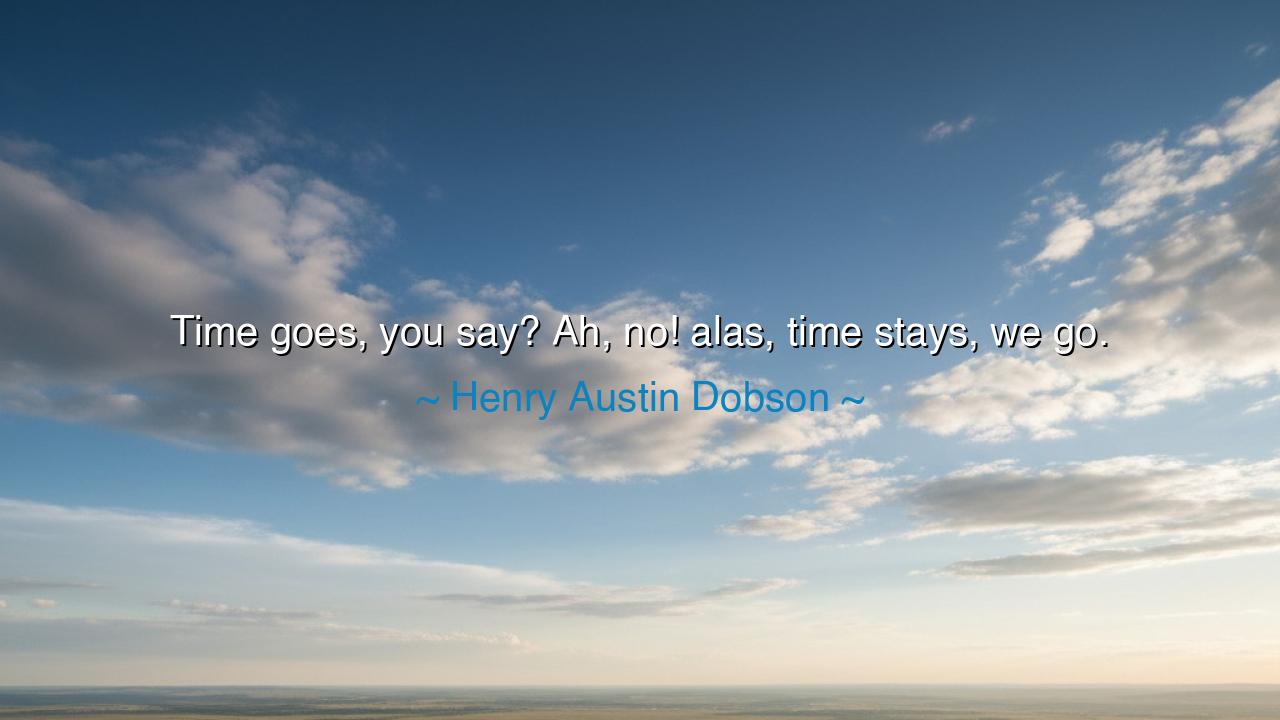
Time goes, you say? Ah, no! alas, time stays, we go.






The English poet and essayist Henry Austin Dobson once gave us a line that pierces the heart with its simplicity and truth: “Time goes, you say? Ah, no! alas, time stays, we go.” With this reversal of thought, he shatters the common saying that “time passes.” For in truth, time does not move—we are the ones carried forward, generation after generation, into the silence of mortality. The hours and days remain, endless in their cycle, but we, fragile and fleeting, are swept along, leaving only memory behind.
The origin of this reflection lies in Dobson’s meditations on the brevity of human life and the permanence of time itself. Living in the late nineteenth century, he was part of an age that was beginning to sense the vastness of cosmic time through science, while still clinging to the ancient awareness of human frailty. His words echo both a poet’s sorrow and a philosopher’s recognition: time is eternal, but man is not. We come and go, while the sun still rises, the stars still turn, and the seasons repeat without us.
The ancients knew this truth well. Marcus Aurelius, the Stoic emperor, reminded himself that soon he and all around him would be gone, “but the world will go on as it always has.” The psalmist declared, “A thousand years in Thy sight are but as yesterday.” The Greeks carved upon their tombs the words: “As we are, so you shall be.” All these voices proclaim what Dobson compresses into a single lament: we do not watch time pass; time watches us pass.
History gives us vivid illustrations of this truth. Think of the ruins of Pompeii, where the lives of thousands ended in a single day, yet the stones remain, the streets remain, and the mountain still smokes. Or recall the vast empire of Egypt, with its pharaohs and mighty pyramids. The rulers are dust, their names scarcely remembered, but the river Nile flows as it always has. Time stayed—the people went. This is the sober lesson of history: monuments may endure, nature may endure, but flesh and blood are swift shadows upon the stage.
The meaning of Dobson’s words is therefore both tragic and liberating. Tragic, because they remind us of our impermanence; liberating, because they awaken us to urgency. If time stays while we go, then our lives must not be wasted in idleness or vanity. We must fill the little span we are given with deeds worthy of remembrance. The permanence of time calls us not to despair, but to act—to live fully, love deeply, and leave behind something that will outlast our brief passing.
Therefore, the lesson is clear: do not squander the precious breath you are given. Do not live as though you had eternity in this world, for you do not. Instead, honor time by how you spend your own passing days. Know that while the hours remain unmoved, your chance to live them will not return once lost. Time will not go—you will. Make your going beautiful.
In practice, I counsel this: each day, pause and remember that you are moving through time, not time through you. Let this thought sharpen your priorities. Speak the words of love you have delayed, forgive the wound you have carried too long, begin the work you were born to do. For soon enough, you shall go, and time shall remain, carrying forward the echo of your choices.
Thus, remember the solemn cry of Henry Austin Dobson: “Time stays, we go.” Let it humble you, awaken you, and move you to live with courage. For though you will one day depart, the mark you leave upon the fabric of time may endure, a testimony that though you passed, you truly lived.






AAdministratorAdministrator
Welcome, honored guests. Please leave a comment, we will respond soon